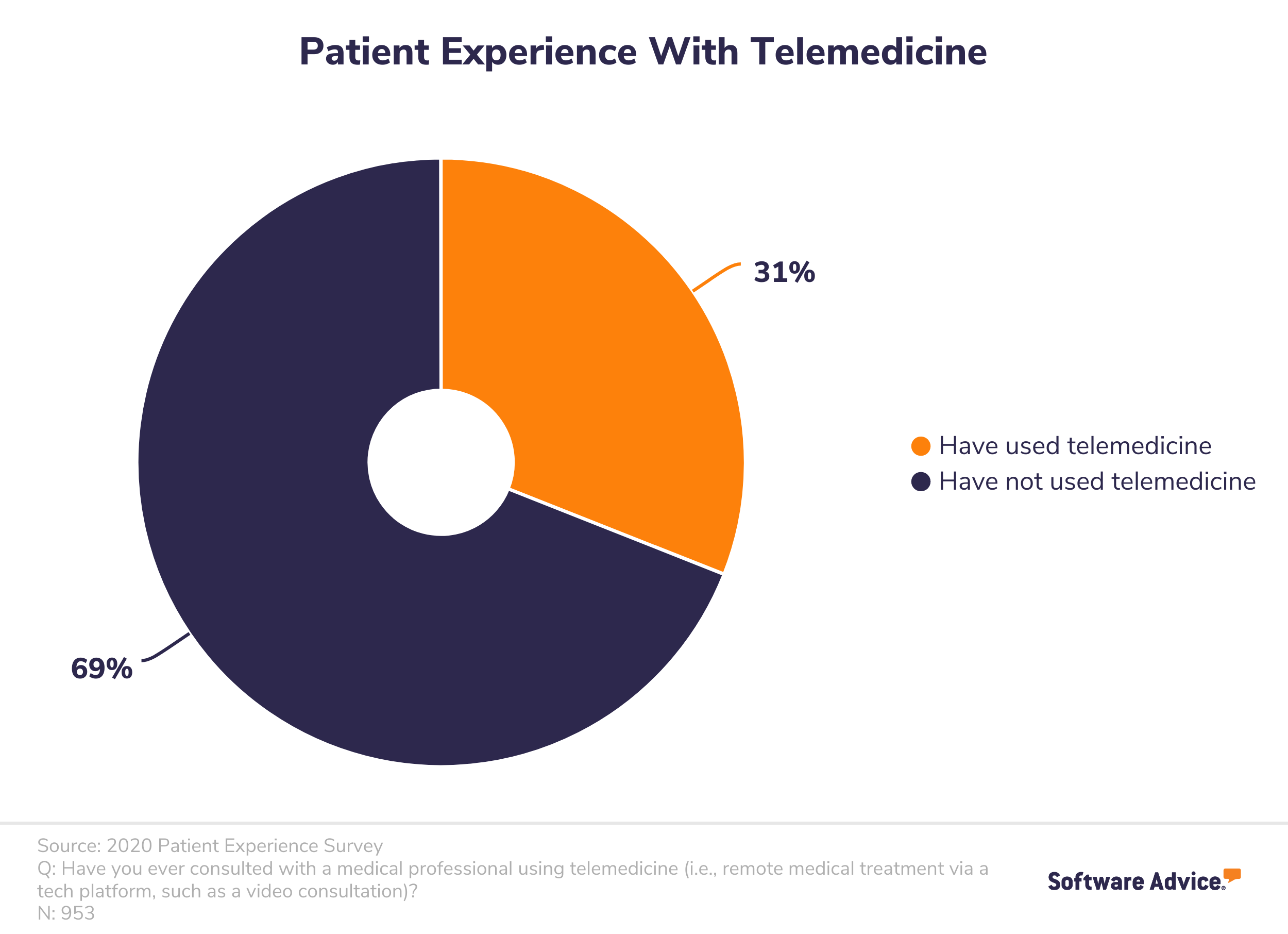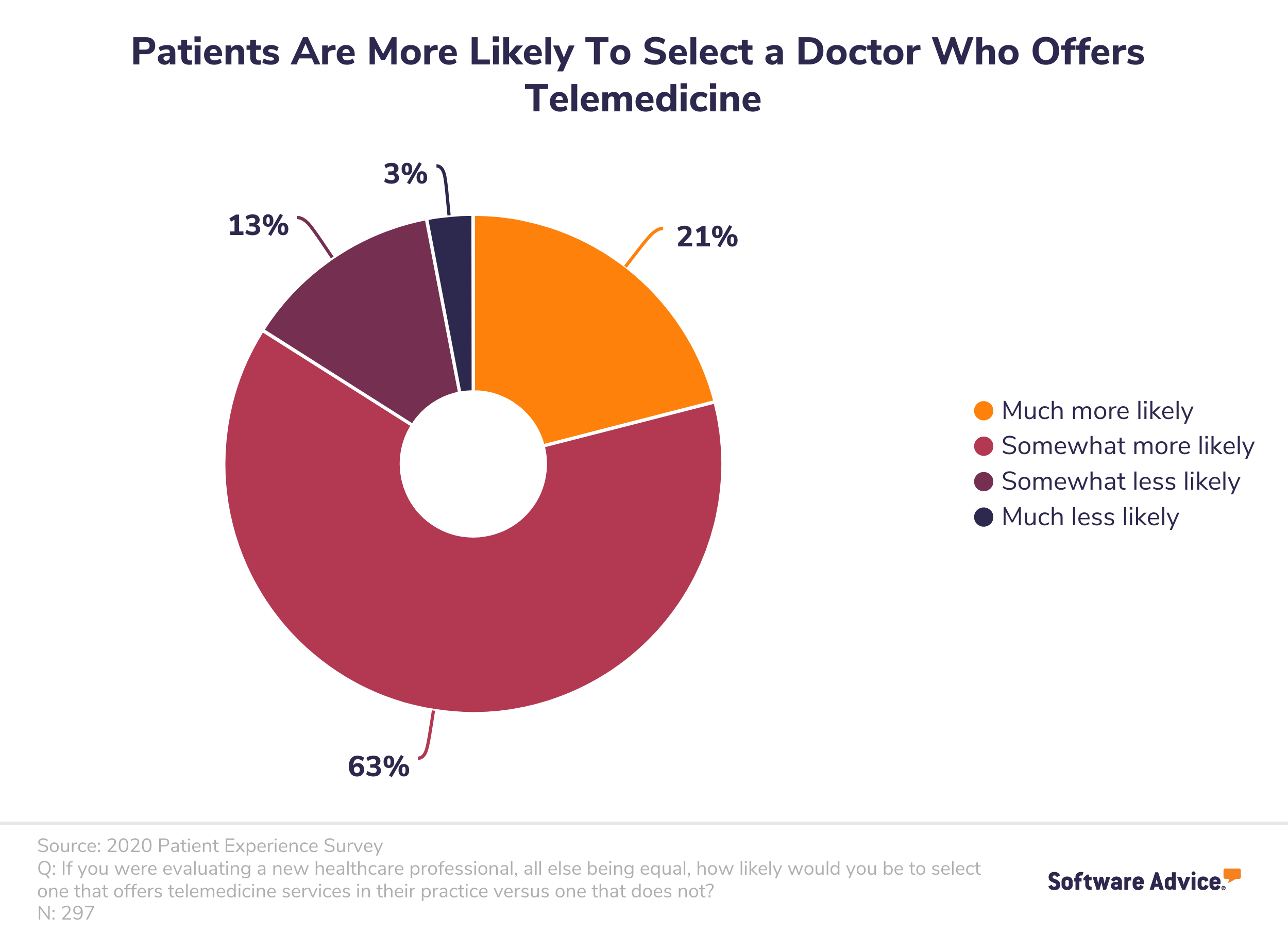The Benefits of Telemedicine for Doctors and Patients
When it comes to reaping telemedicine benefits, things can get complex:
Cost can vary widely, depending on things like feature integration and deployment.
Functionality can range in usefulness, depending on your type of practice and patient interest.
Value to patients depends on patient demographics and personal preferences.
Even with all these things in mind, one thing is certain: choosing the right telemedicine system for you and your patients can make a huge difference in keeping you competitive.
And this is even more true as we continue to deal with the current pandemic and the need to provide patients healthcare remotely as much as possible.
In this article, we’ll outline the top telehealth benefits for patients as well as doctors to help you feel better about investing in the right software.
Patients love telemedicine, here’s why
Over the years, we’ve run patient surveys to track patient awareness and preference for telemedicine technology, and we’ve found a very steady upward trend. In 2017, our survey found that only 17% of patients had experience using telemedicine.
When we asked patients again in February of 2020, that number had jumped to 31%.

Given how many practices transitioned to remote exams during the pandemic, it wouldn’t be at all surprising to find out that number has gone up even more dramatically in the last six months.
But the important thing isn’t that more patients are using telehealth—it’s that they actually prefer it. In that same survey from the beginning of this year, we learned that an astounding 84% of patients would choose a medical provider who offers telemedicine over one who doesn’t when selecting a new doctor.

We also asked patients with experience using telehealth what they liked most about it, and learned that the top benefit for patients were:
Quick access to care
Access to care without having to leave their homes
Shorter wait times
High quality of care
From a patient perspective, the benefits of telemedicine boil down to convenience and easy access to medical advice—two things that will always improve the patient experience.
Top telemedicine benefits for doctors
Telemedicine doesn’t only benefit patients; doctors will enjoy plenty of advantages through this technology as well.
To find out exactly what those benefits are and provide valuable insight into using telehealth for small practices, we spoke with three medical providers about their experience with telehealth.
Here’s what they had to say.
Dr. Mayer uses telemedicine to serve more patients
Dr. John Mayer is licensed in six states as an associate staff psychologist through Doctor on Demand, and has been a provider with this telemedicine service for three years. He primarily uses video conferencing to accommodate patients who live outside driving distance from his office—both nationally and internationally.

“I’ve always had a commitment to reaching people to whom mental health services are difficult to come by … and telemedicine is a perfect vehicle for this. It is community mental health at its finest.”
Dr. Mayer, associate staff psychologist through Doctor on Demand
When asked what prompted him to begin offering telemedical conferencing to his patients, he pointed to the ability to expand his reach to so many patients who otherwise wouldn’t be able to meet with a psychologist and get medical care. To Dr. Mayer, a telehealth solution and mental healthcare are a perfect marriage.
For the patient, he listed the following telemedicine benefits:
Convenience
Affordability
Ease in establishing rapport
Lowered resistance to treatment
And for the mental healthcare providers like himself, the advantages he’s seen firsthand include:
Ability to focus more on treatment
Reduced paperwork and scheduling demands
Customer service for addressing technical issues
Dr. Mayer’s final recommendation for small practices considering telehealth: Go for it.
The benefits far outweigh the costs, and the ability to reach more patients quicker without dealing with paperwork means providers will see ROI quickly.
Dr. Olp Uses telemedicine to communicate more rapidly
Dr. Ashlie Olp is the lead direct primary care physician at Olp Family Medicine in Carmel, Indiana. While she sees all types of patients at her family medicine practice, Dr. Olp specializes in women’s health.
Dr. Olp was inspired to start a Direct Primary Care (DPC) practice after experiencing the struggle of connecting with a qualified provider from the patient’s perspective.

“Everyone should be heard and given adequate time to tell their story, not just a 15 minute office visit to check vitals and boxes on a chart.”
Dr. Olp, lead direct primary care physician at Olp Family Medicine
One of Dr. Olp’s favorite things about her telemedicine program is that it allows patients to seek advice about particular issues and Dr. Olp can respond quickly:
“I am able to reply within seconds, minutes, or hours (at the very most) […] with ideas and options for them to try out so we can decide together if they should come visit me at the office. It saves them a trip many times, and it allows them to ask from the comfort of their own home.”
In addition to saving time for both herself and her patients, Dr. Olp talked about the benefit of having immediate access to a healthcare provider as one of the best things about telehealth. It gives patients the time and opportunity to discuss whatever’s on their mind in the moment, rather than having to wait several days to get an appointment and receive care.
Dr. Olp’s recommendation for small practices considering telemedicine: It depends.
In her words, “not all problems can be managed via telemedicine, but for those that can, it is very convenient.” If your practice specializes in treating conditions that can be diagnosed and managed remotely, telehealth is an essential investment.
Támara Hill uses telemedicine to make patients feel more comfortable
Támara Hill is a clinical trauma therapist, consultant, and author who works with children and adolescents dealing with mood disorders, trauma, and other behavioral disorders. She also works with adults dealing with grief, loss, and/or major life transitions.
She’s offered telehealth services for over two years to meet her patients where they are and make the process of providing care and counseling as easy for them as possible.

“I think there is a big future for telemedicine.”
Támara Hill, clinical trauma therapist
Hill’s experience with counseling young children, however, has taught her that telemedicine might not be right for every patient: “No child can sit still for 1 hour to do a session on their phone. They won’t connect.”
Dr. Hill’s recommendation for small practices considering telemedicine: Do the research before you make the decision.
It is absolutely a valuable tool with applications for many different types of practices, but you need to know for sure you’re one of them before committing to it. As Hill put it, “There are so many variables that need to be considered before it is used with a client.”
The benefits of telemedicine make it a wise investment
So, what’s the verdict? Do small practices need to offer telemedicine in order to stay competitive and ensure patient satisfaction? The answer is unequivocally yes.
Your small practice should absolutely be offering at least some telemedicine applications to your patients, especially as we continue to wait for a reliable COVID-19 vaccine.
Telemedicine is a very useful way to find, connect with, and deliver patient healthcare, according to Hill and Drs. Mayer and Olp, but first you need to understand which applications best fit your practice and your patients’ needs.
Fortunately, there are telemedicine software providers that allow you to choose which features to utilize and which ones to save for later, and many of these platforms can grow with your practice as you and your patients become more comfortable using remote healthcare software.
If you’re not already using telemedicine and want to learn more about it, you can call or chat with our team of medical software advisors anytime.
You can also keep reading up on it with these resources:
3 Types of Telemedicine and How They Each Improve Patient Experience
What You Need to Know About Telemedicine in the World of COVID-19
Finally, check out our telemedicine FrontRunners to compare platforms and figure out which one is the best fit for you as a care provider.